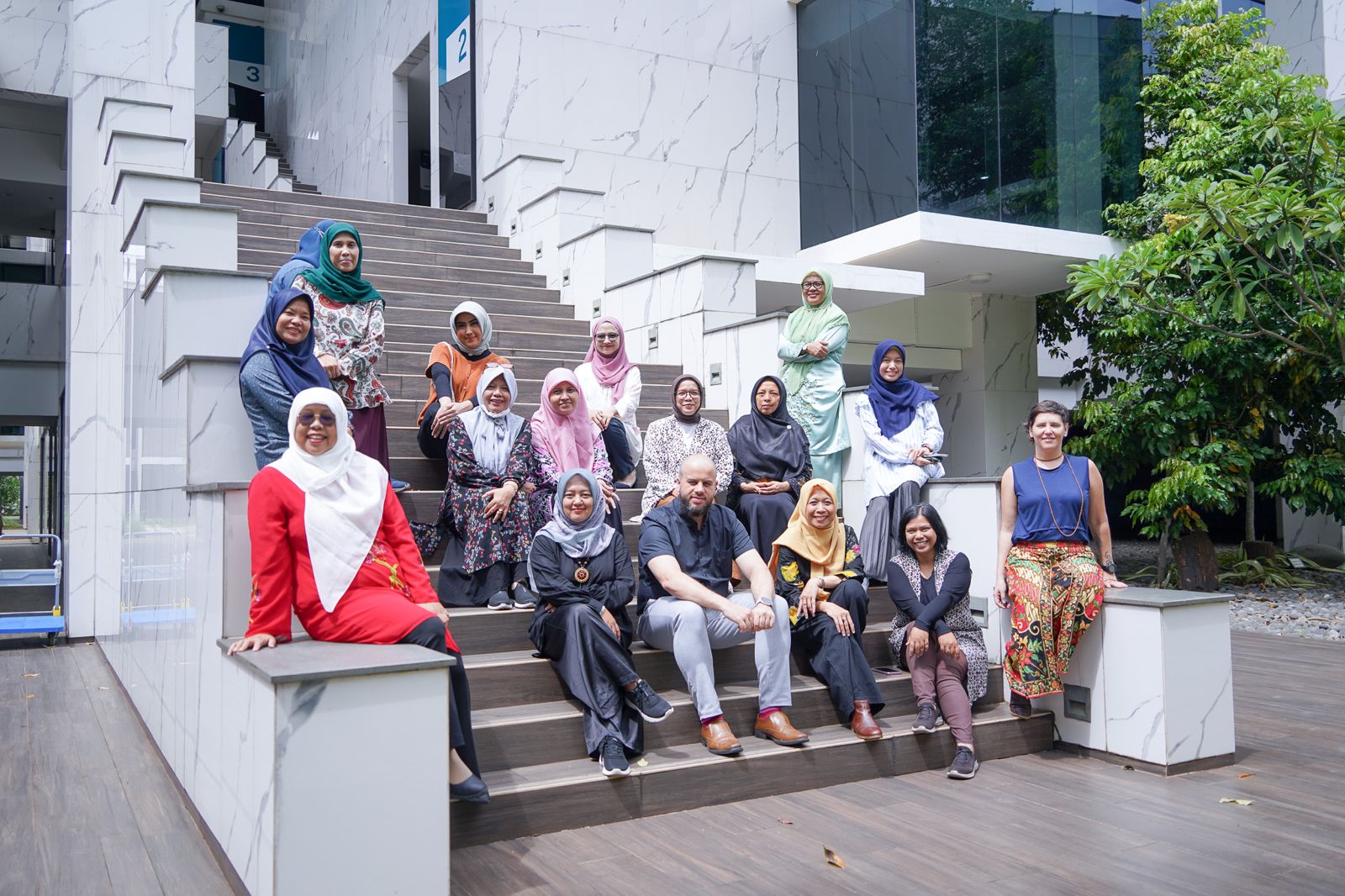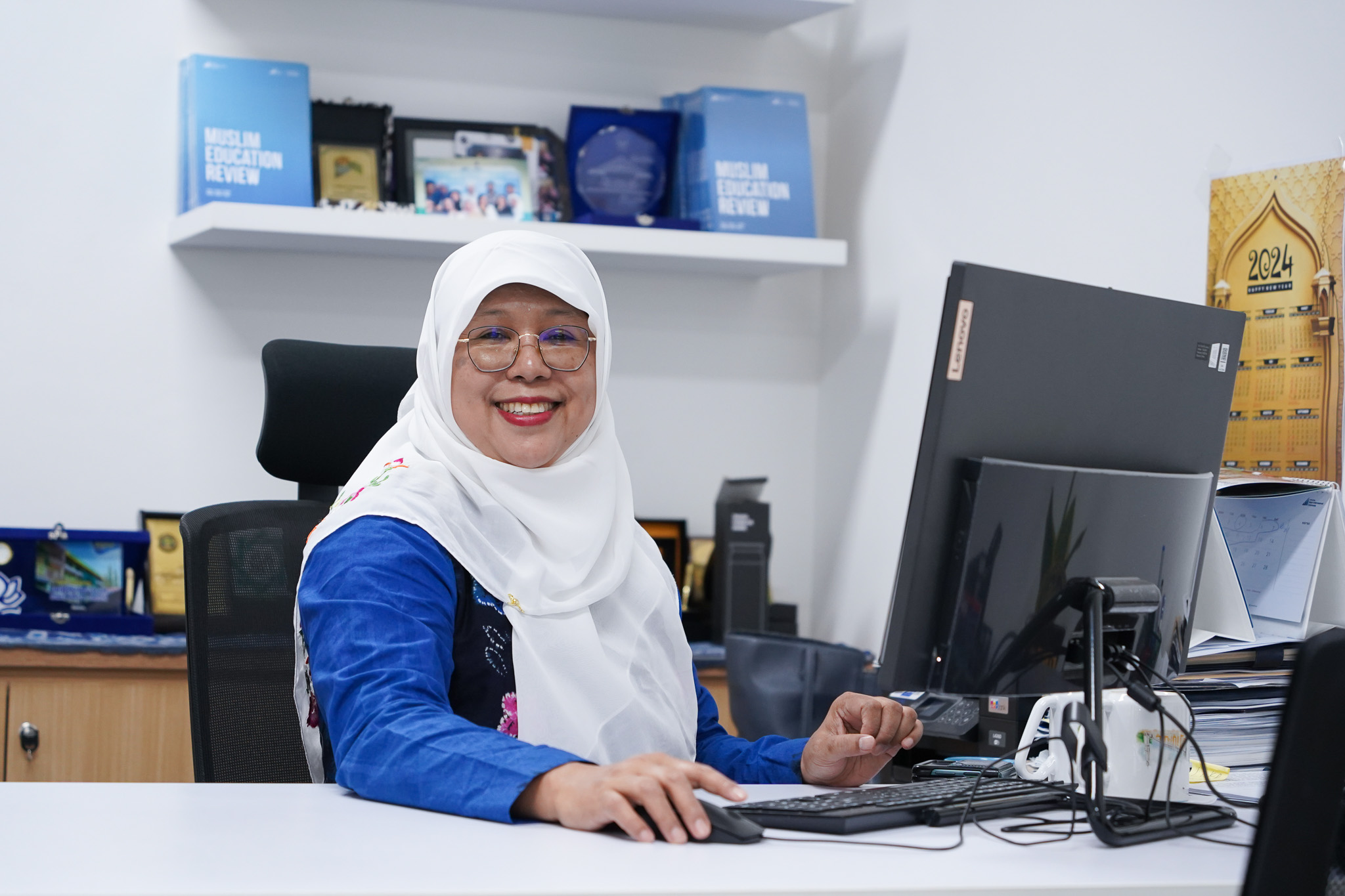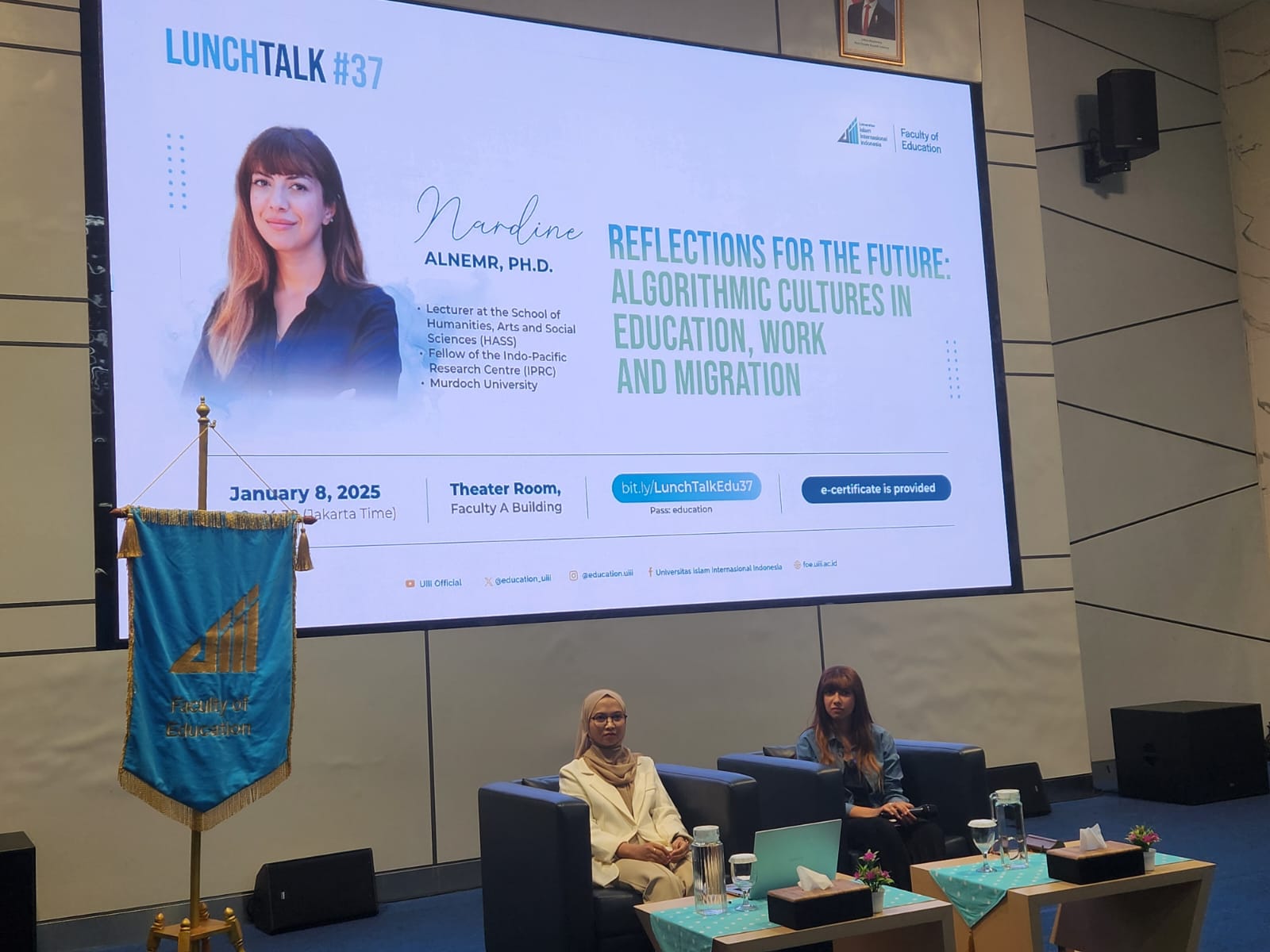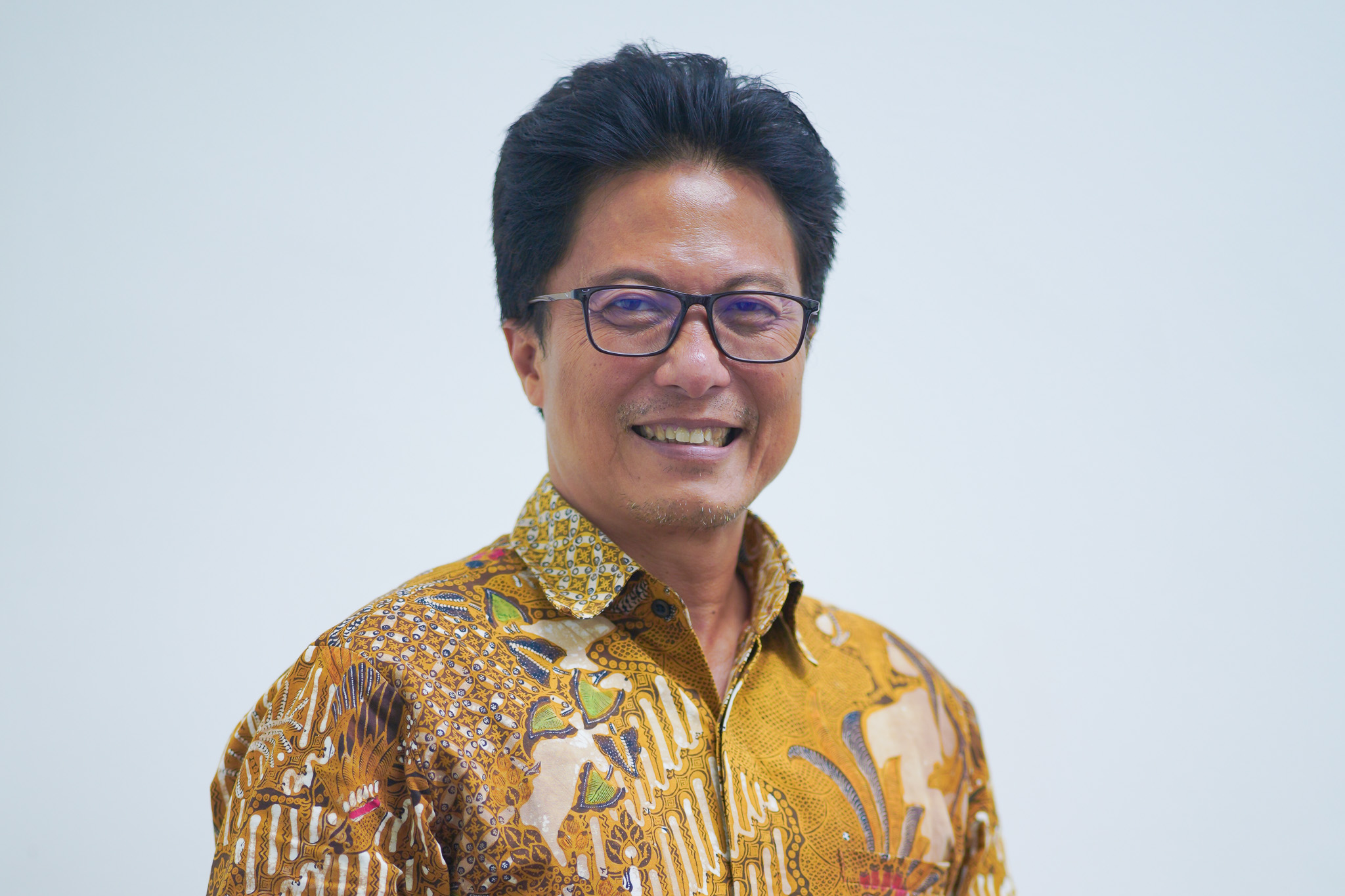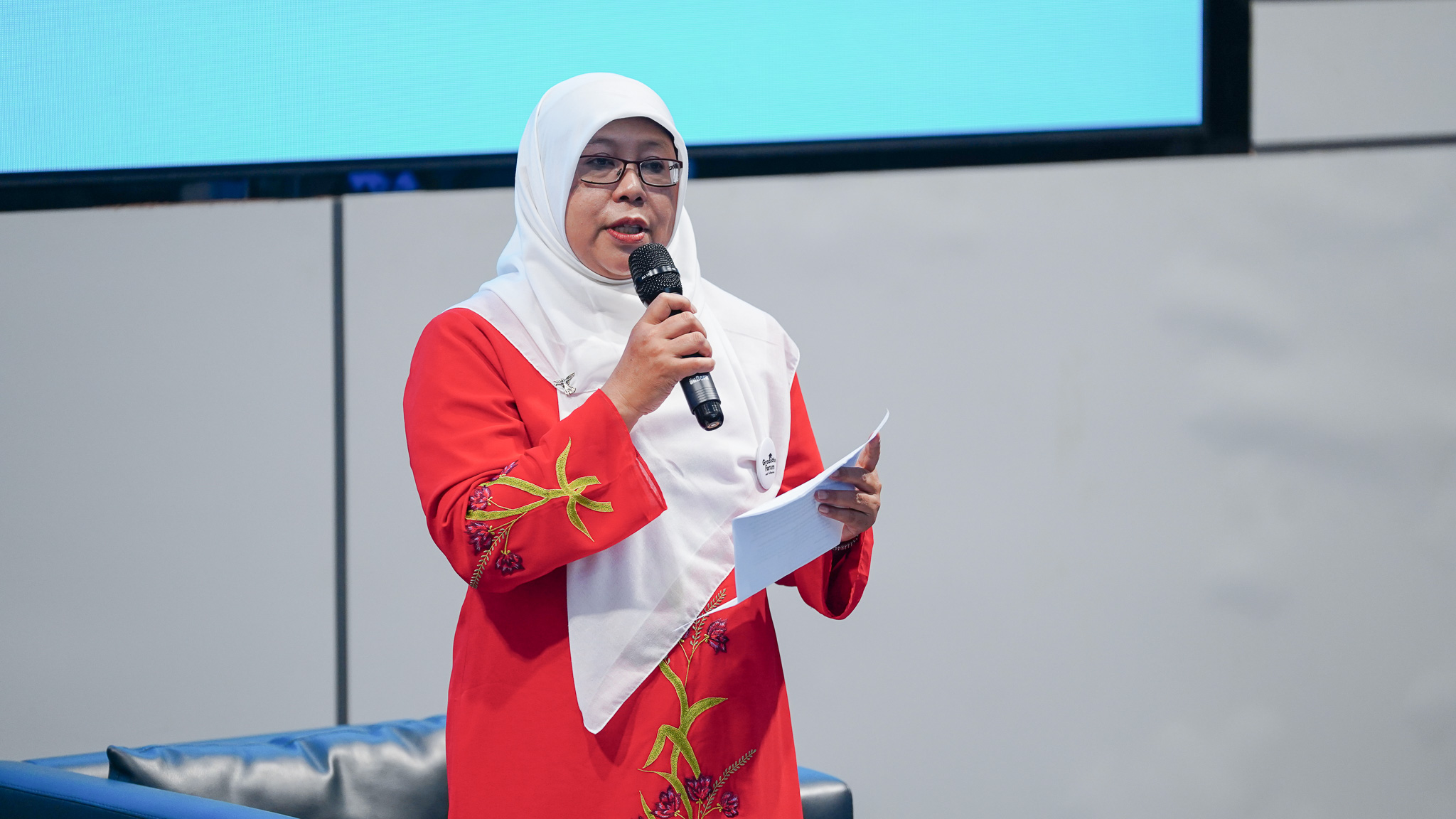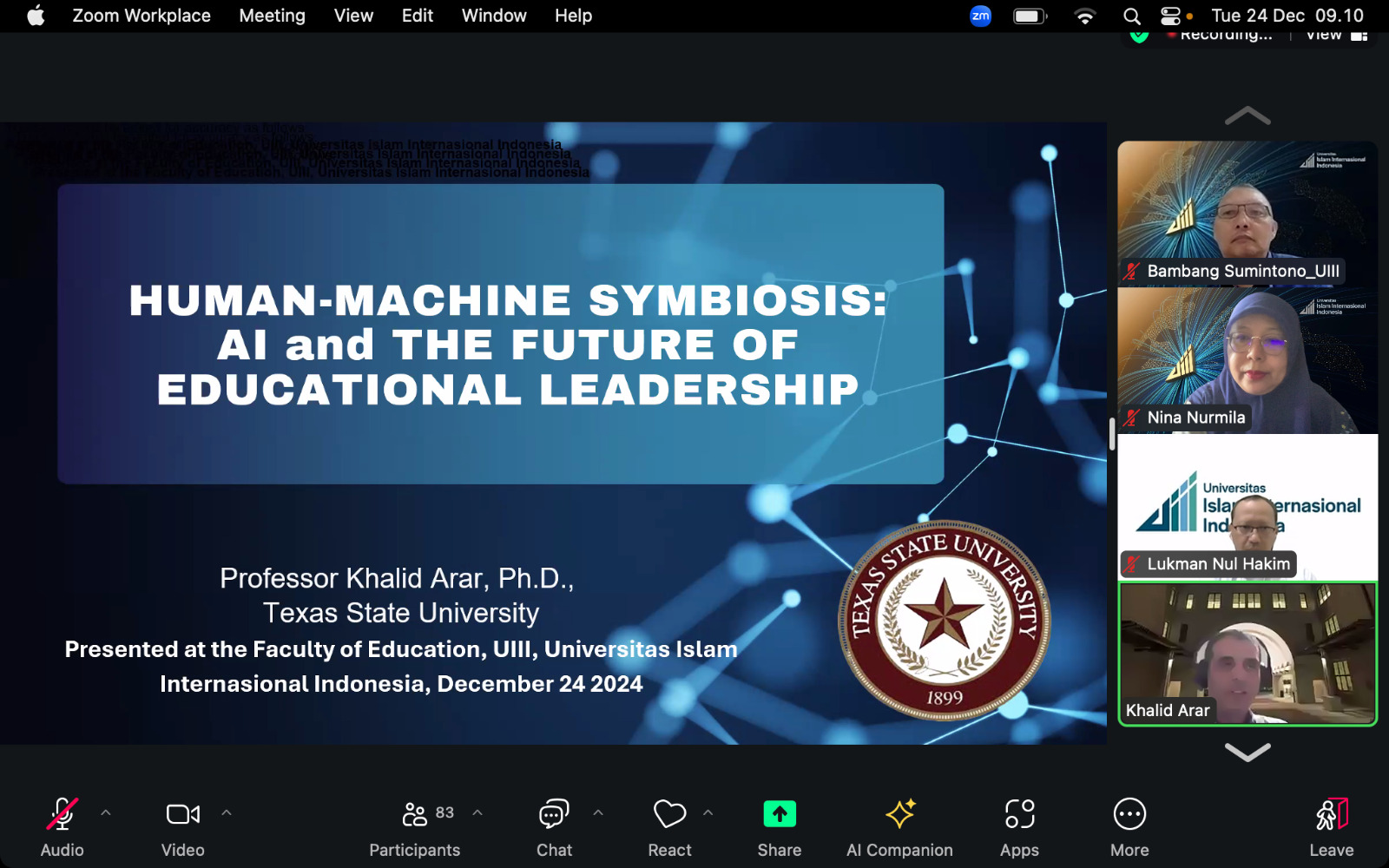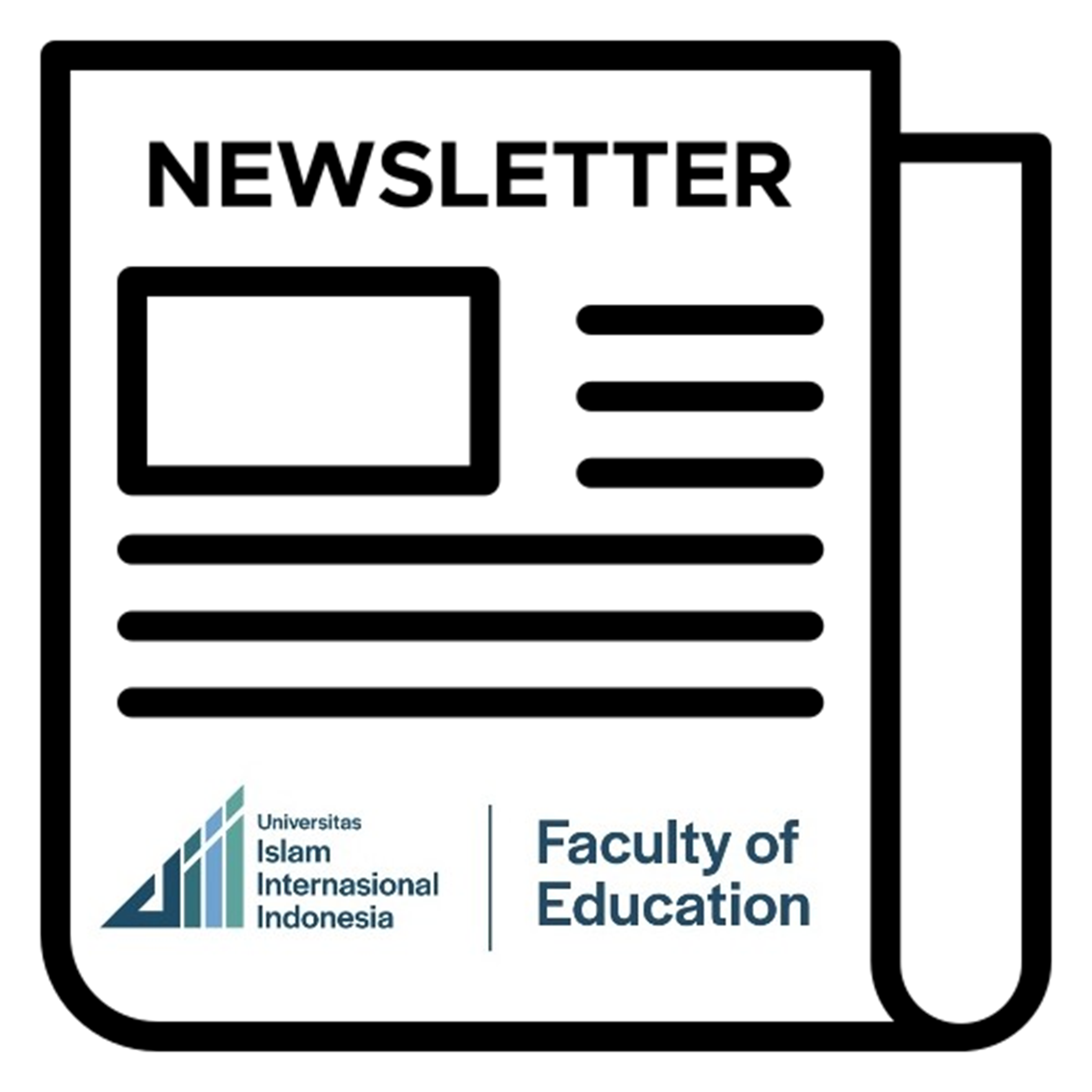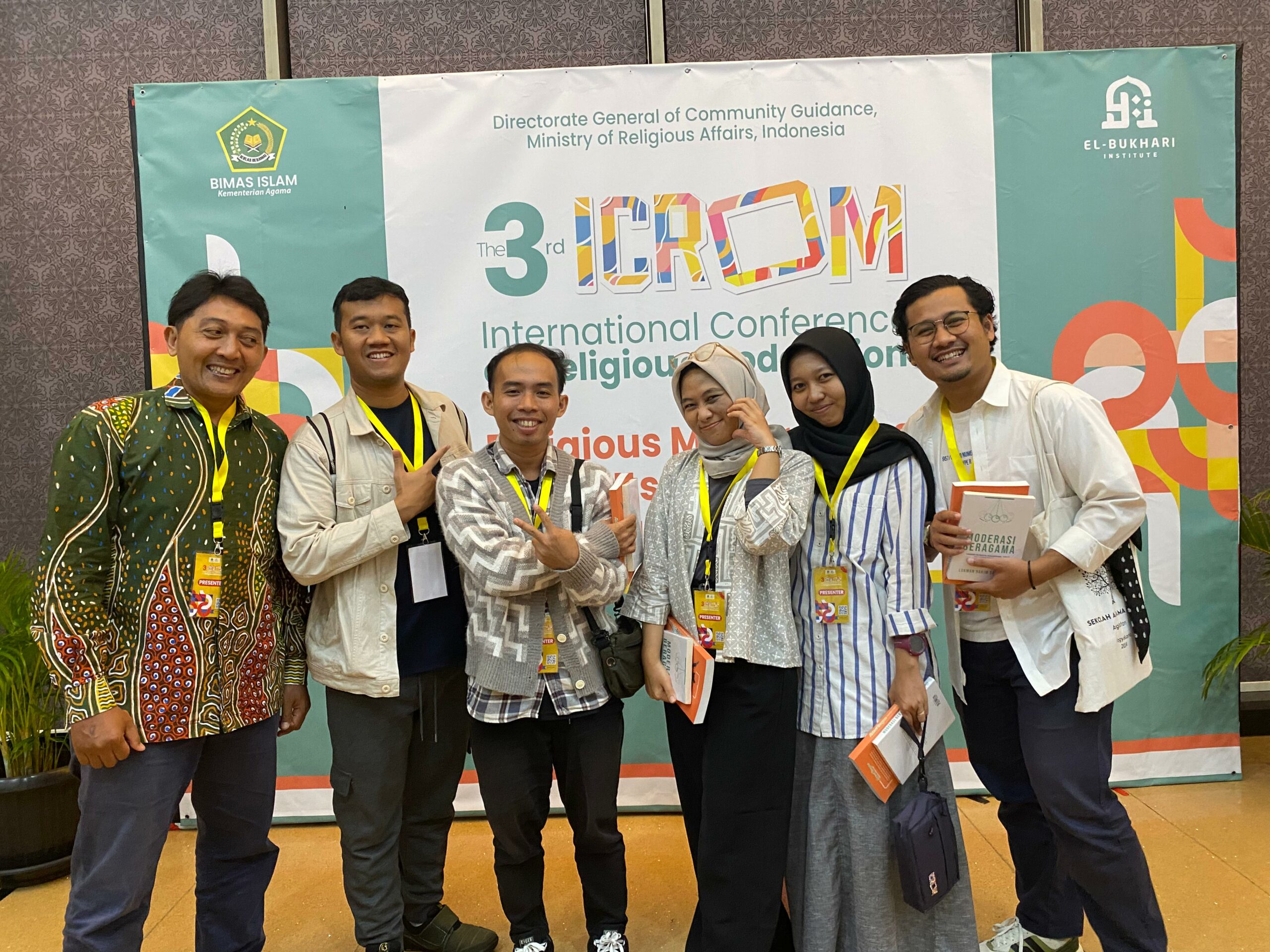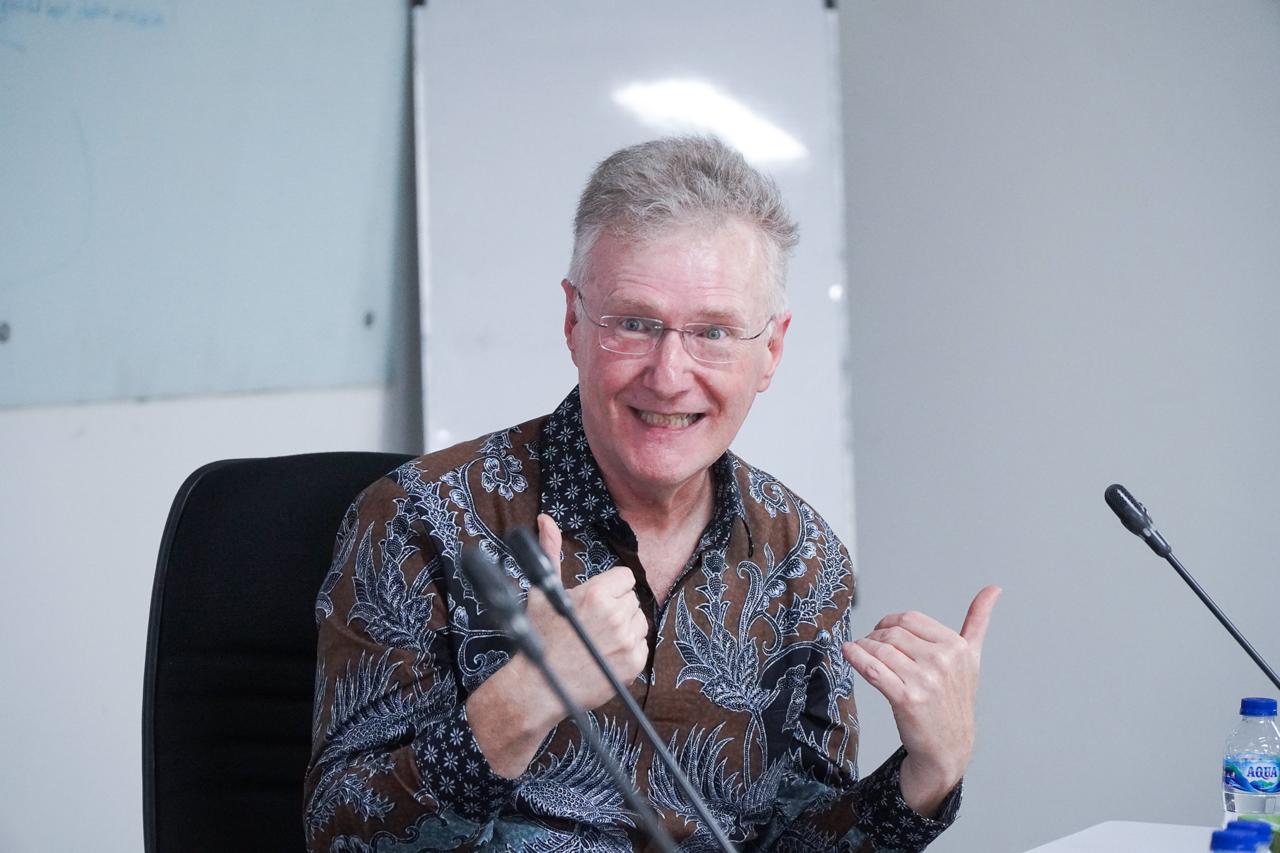‘UIII Has Potential to Further Development & Growth’: Prof. Camila Prando of Brazil

‘UIII Has Potential to Further Development & Growth’: Prof. Camila Prando of Brazil
January 15, 2025
Contributor: Supriyono | Editor: Dadi Darmadi | Photos: Achmad Jatnika & Virda Lalitya Umam
During her recent visit to Universitas Islam Internasional Indonesia (UIII), Prof. Camila Prando, a distinguished scholar from the University of Brasilia, shared her thoughts on the university's vibrant academic environment and potential for growth. Specializing in epistemological reform, Prof. Prando’s expertise lies in how knowledge systems evolve, and her impressions of UIII reflect her keen interest in the university’s efforts toward educational transformation.
"Before coming to UIII, I had the chance to speak with Prof. Nina about her experiences here," Prof. Prando remarked, referring to Prof. Nina Nurmila, the Dean of UIII Faculty of Education. "I am deeply impressed by the wide-ranging fields of research that are actively pursued at this institution. The diversity of perspectives brought by professors with different academic backgrounds is truly remarkable."
For Prof. Prando, one of the most notable aspects of UIII was its commitment to fostering effective education through a mix of disciplines and perspectives. "The different faculties and research areas contribute to a unique educational experience," she explained. "What stands out to me is the potential this university has for further development and growth. UIII offers a lot in terms of possibilities, and I hope it continues to nurture these strengths."
Prof. Prando’s interest in the university’s research was evident as she expressed her desire to observe the ongoing academic activities. "I would love to attend some classes to better understand the research projects happening here. There’s so much to learn from the work being done, and I’m eager to return and explore more in the future."
Prof. Prando’s visit was part of a decolonial writing workshop held at UIII in equipping early-career scholars with the skills to navigate and challenge academic structures that often marginalize voices from the Global South. Her positive remarks underscores UIII’s commitment to academic excellence. UIII is proud to have hosted such a distinguished guest, whose insights and perspectives will surely contribute to the university’s continued growth and success in advancing education and research on a global scale.
Who Shapes What We Know? UIII Workshop Challenges Global North’s Domination in Knowledge Production

Who Shapes What We Know? UIII Workshop Challenges Global North’s Domination in Knowledge Production
January 14, 2025
Contributor: Supriyono | Editor: Dadi Darmadi | Photos: Achmad Jatnika & Virda Lalitya Umam
It is argued that the knowledge production is conceivably dominated by the scholars from the Global North, and a decolonial writing workshop held at Universitas Islam Internasional Indonesia (UIII) seeks to challenge the status quo.
The workshop, part of a global initiative funded by the British Academy, brought together scholars and participants to examine the deeply rooted inequalities in knowledge production. Held on January 14–15, 2025, at UIII’s Faculty A Building, it aimed to equip early-career scholars with the skills to navigate and challenge academic structures that often marginalize voices from the Global South.
Led by Dr. Leon Moosavi, a British expert in decolonial methodologies from the University of Liverpool; Prof. Camila Prando, a scholar specializing in epistemological reform from the University of Brasilia; and Prof. Nina Nurmila, a gender expert and Dean of UIII's Faculty of Education, the event followed the same workshop held in Brazil last December. According to Dr. Moosavi, the workshop received an overwhelming number of applications, but his team could only accommodate 24 participants—12 from Brazil and 12 from Indonesia.
“We're working to unsettle the colonial injustices and historical inequalities by first acknowledging their continued presence. Additionally, we are deliberately focusing on scholars from the Global South, who often lack the same opportunities available to their counterparts in the Global North. The project also incorporates a gender dimension, as all the participants are women," Dr. Moosavi said.
He explained that their goal was to share experiences and insights to equip early-career scholars with the tools needed to navigate academic writing and publishing successfully. “We'll encourage them to share the knowledge and insights with other people. Maybe they will organize their own workshops. We hope it will have a knock-on effect in other parts of Indonesia and the broader Indonesian academic community,” said Dr. Moosavi.
Supporting the argument, Prof. Camila Prando of Brazil highlighted the struggles often faced by scholars in the Global South in navigating the academic "rituals" and career systems, particularly regarding access to resources. “As a Brazilian woman, I feel a responsibility to share information and mentor younger students who face challenges with language barriers and limited access to academic journals," she explained.
Prof. Nurmila expressed her pride in hosting the workshop at UIII, noting its alignment with the university’s mission to foster globally impactful scholarship rooted in local contexts. “By empowering women scholars and addressing systemic inequalities, we are contributing to a more just and inclusive academic landscape,” she said.
The workshop features intensive sessions designed to enhance academic writing and publishing skills while encouraging participants to critique and reshape the structures of knowledge production. This groundbreaking program underscores UIII’s role as a hub for academic innovation and inclusivity, paving the way for a new generation of scholars who are equipped to challenge and redefine the boundaries of knowledge.

UIII to Host Decolonial Writing Workshop: A Global Collaboration on Academic Reform

UIII to Host Decolonial Writing Workshop: A Global Collaboration on Academic Reform
January 13, 2025
Contributor: Dadi Darmadi | Photos: Achmad Jatnika
Depok, Indonesia, January 13, 2025 – Tomorrow, Universitas Islam Internasional Indonesia (UIII) will open its doors to scholars and writers from across the globe for the Decolonial Writing Workshop, a bold initiative to dismantle entrenched academic hierarchies and foster inclusive scholarship. This two-day event, taking place on January 14–15, 2025, exemplifies the power of international collaboration, bringing together thought leaders from Indonesia, Brazil, and the United Kingdom.
Organized in partnership with academics from diverse cultural and intellectual traditions, the workshop underscores the interconnected nature of today’s academic landscape. Facilitators include Dr. Camila Prando, a Brazilian scholar specializing in epistemological reform, Dr. Leon Moosavi, a British expert on decolonial methodologies, and Prof. Nina Nurmila, a leading Indonesian academic and Chair of the Faculty of Education at UIII.
A Growing Collaboration
Participants, hailing from various academic disciplines, will engage in sessions that blend theory with practical application. The opening day sets the stage with discussions on Epistemological Writing and Decolonial Writing, followed by an in-depth session led by Prof. Nina on crafting articles and book proposals.
Day two shifts focus to the publishing process, offering participants personalized feedback during review sessions. In a testament to the workshop’s global vision, video messages from editors and publishers will provide insights into navigating the challenges of academic publishing across cultural and geopolitical boundaries.
A Collaboration Beyond Borders
The workshop reflects a growing recognition of the need for collaborative efforts to address systemic inequities in academia. Indonesia, as the host, positions itself as a bridge between Global South and Global North perspectives. Brazil contributes its critical lens on epistemological reform, while the UK brings expertise in decolonial methodologies.
Prof. Nina Nurmila’s leadership highlights UIII’s commitment to fostering intellectual innovation. Her contributions, particularly in gender studies and decolonial thought, serve as a cornerstone for the university’s growing reputation as a hub for critical scholarship.
A Platform for Change?
Held at UIII’s vibrant Depok campus, the workshop represents more than an academic gathering—it is a call to action. By challenging Eurocentric narratives and amplifying marginalized voices, the event aims to inspire participants to drive systemic change within their own institutions and communities.
As the workshop approaches, scholars and writers will convene not only to exchange ideas but to envision a future where academic structures are more equitable and inclusive.
The Decolonial Writing Workshop is poised to become a landmark event, reaffirming the potential of international collaboration to reshape the contours of global scholarship.
Stay tuned for updates as the Decolonial Writing Workshop unfolds at UIII, paving the way for a new era of critical, decolonial discourse in academia.
LunchTalk #37 Explores Algorithmic Cultures in Education, Work, and Migration

LunchTalk #37 Explores Algorithmic Cultures in Education, Work, and Migration
January 09, 2025
Contributor: Supriyono | Editor: Dadi Darmadi | Photos: Virda Lalitya Umam
Depok, January 8, 2025 — UIII Faculty of Education hosted its 37th LunchTalk session, featuring Dr. Nardine Alnemr, Lecturer in Politics and Policy at the School of Humanities, Arts and Social Sciences (HASS) and Fellow at the Indo-Pacific Research Centre (IPRC), Murdoch University, Australia. The session explored the theme “Reflections on the Future: Algorithmic Cultures in Education, Work, and Migration.”
Dr. Alnemr's presentation examined the transformative role of algorithms in shaping societal structures and individual experiences, emphasizing their implications across critical domains such as education, workforce dynamics, and global migration patterns.
Drawing from recent scholarship, Dr. Alnemr explained how algorithms increasingly influence work dynamics, public policy, interpersonal relationships, and even electoral processes. This pervasive integration, she argued, fosters a co-evolutionary relationship between human agency and algorithmic political frameworks.
She built upon the concept of "algorithmic cultures," referencing Ted Striphas (2015, 2023), who highlighted the pre-internet presence of computational logics in shaping societal behaviors. She explored the intersections between governance systems and algorithmic decision-making, or "algocracy”.
In education, Dr. Alnemr discussed how algorithmic logic underpins educational technologies, shaping notions of "better" or "worse" outcomes. These technologies, she noted, strive to resolve uncertainties about the causal links between "inputs" and "outputs" in learning processes.
Highlighting key areas in education, Dr. Alnemr noted the growing reliance on digital tools has placed pressure on educators to keep pace with technological advancements. Yet, these tools may compromise deeper pedagogical and philosophical goals.
Dr. Alnemr shared findings from Ireland's National Youth Assembly on AI, which she conducted in 2022 where young participants deliberated on the ethical and practical implications of AI across society, governance, and education. Their concerns included disparities in AI access, insufficient teacher training, and a potential lack of engagement for students in AI-driven learning environments.
In her concluding remarks, Dr. Alnemr invited attendees to reflect on how algorithmic cultures might shape education, work, and migration in the decades ahead. She posed thought-provoking questions about inclusivity, ethical responsibilities, and epistemic diversity, encouraging the audience to consider the long-term impacts of today’s decisions on future generations.
LunchTalk #37 exemplified UIII's commitment to fostering critical discussions on contemporary global challenges. As algorithmic technologies continue to reshape societal norms, events like this provide a platform for thought leaders and audiences to collaboratively envision a more equitable and ethical future.
The Return of Indonesia’s National Exam: A Step Backward or Forward?

The Return of Indonesia’s National Exam: A Step Backward or Forward?
January 07, 2025
Contributor: Dadi Darmadi | Photos: Pexels/Agung Pandit Wiguna, Achmad Jatnika
In 2021, Indonesia abolished its national exam (UN), a move once celebrated as a step toward a more holistic and less stressful education system. But now, with plans to reinstate it by the 2026 academic year, a renewed debate is unfolding across the nation.
Alpha Amirrachman, PhD, a prominent education expert at the Indonesian International Islamic University (UIII), weighs in on the challenges, implications, and potential path forward for one of the country's most controversial policies.
A Lost Benchmark?
“The abolition of the national exam, although appeared to be popular, has left a significant void,” Dr. Alpha began, emphasizing the role the exam once played in mapping educational quality and guiding students’ academic trajectories.
He pointed to the ripple effects on international education opportunities. “Universities in the Netherlands, for example, are hesitant to admit Indonesian students now because there’s no standardized assessment to gauge their academic readiness. Even domestic universities struggle because the current national assessment is sampling-based rather than individual-focused. What we need is an individual assessment system to ensure students are adequately prepared for higher education.”
Adding to the concern is Indonesia’s declining global competitiveness, Dr. Alpha cited the country’s slipping scores in the Program for International Student Assessment (PISA) as evidence of a broader systemic issue. “Since the abolition of the national exam, our PISA rankings have dropped, which is alarming for a nation aiming to build a Golden Generation by 2045.”
Hope for a Thoughtful Approach
Despite these concerns, Dr. Alpha acknowledged the government’s efforts to involve diverse stakeholders in rethinking the exam’s structure. “The Ministry of Primary and Secondary Education is taking a cautious, participatory approach by consulting teachers, school leaders, educational experts, and community-based organizations,” he noted, adding what he coined as “meaningful participation.”
Still, he urged the ministry to go beyond traditional academic metrics. “A redesigned national exam must address not only cognitive skills but also broader competencies, such as emotional intelligence and social adaptability. Furthermore, the 2025 academic year should serve as a transitional phase to refine the system before full implementation in 2026,” he recommended.
Building a Supportive Ecosystem
For Dr. Alpha, the success of any assessment system hinges on the educational ecosystem. He proposed establishing an independent national assessment body to design and administer exams with professionalism and impartiality.
“This body should operate independently from the ministry to ensure objectivity and credibility,” he argued.
Addressing the perennial issue of student stress, Dr. Alpha highlighted the ministry’s recent “Seven Habits of Great Indonesian Students” initiative, which encourages daily routines like early rising, praying, exercising, studying happily, eating healthy and nutritious food, socializing and going to bed early. “If consistently implemented with the support from teachers and parents, such simple but powerful habits could significantly enhance students’ physical and mental well-being, creating a more conducive learning environment,” he said.
A Crossroads for Education
The debate over the national exam reflects deeper questions about Indonesia’s educational future. Is the country prepared to strike a balance between maintaining rigorous standards and fostering a supportive, holistic learning environment?
Dr. Alpha concluded with a sobering yet optimistic perspective: “Policy decisions in education must not only address present challenges but also prepare our students for a rapidly evolving future. This is an opportunity to build a system that empowers, rather than burdens, the next generation.”
As Indonesia stands at a crossroads, the stakes are high. Whether the national exam becomes a symbol of progress or regression will depend on the choices made today—and the vision for tomorrow.
UIII Experts Respond to Govt's Plan to Reinstate National Exams

UIII Experts Respond to Govt's Plan to Reinstate National Exams
January 07, 2025
Contributor: Supriyono | Editor: Dadi Darmadi | Photos: Pexels/muallim nur, Achmad Jatnika
The recent announcement by newly appointed Minister of Primary and Secondary Education, Prof. Abdul Mu'ti, regarding the potential reintroduction of the National Exams (Ujian Nasional, or UN) in the 2026 academic year has sparked extensive discussions among education stakeholders. Two education experts from Universitas Islam Internasional Indonesia (UIII) shared their perspectives on the proposed policy shift and its implications.a
Prof. Nina Nurmila: A Strategic Tool for Educational Equity
Prof. Nina Nurmila, Dean of the Faculty of Education at UIII, noted that shifts in national education policies, including the removal and reinstatement of National Exams, have become a recurring trend with each change in government leadership.
"The National Assessment is crucial for mapping educational achievements across regions. It helps identify underperforming areas and allows targeted interventions to improve student outcomes. High-achieving schools can also serve as models for others," Prof. Nina explained.
She expressed optimism about the minister's intention to enhance and equalize educational quality across Indonesia, emphasizing the need to address significant gaps between urban and rural regions, as well as disparities between Java and non-Java areas. "If implemented effectively, the National Assessment could ensure that no student is left behind," she added.
Dr. Bambang Sumintono: Addressing Past Challenges and Ensuring Transparency
Dr. Bambang Sumintono, Head of UIII's PhD in Education program, raised critical questions about the rationale and execution of the proposed policy. He questioned whether there had been thorough studies proving that the removal of National Exams effectively reduced the urban-rural educational gap. He also highlighted that while the previous National Assessment produced literacy and numeracy reports, these were only available at the district level and not fully disclosed to the public.
Dr. Bambang expressed concerns about repeating past issues, such as the heavy emphasis on rote memorization and the psychological pressure placed on students and parents. "In many countries, standardized exams are administered in the middle of study rather than at the end, reducing stress and allowing room for improvement," he noted.
He emphasized the need for clarity regarding the design and implementation of the revamped National Exams. Questions remain about the subjects to be tested, the weight of exam scores in graduation decisions, and how the system will avoid creating new psychological burdens for students.
The Shift from UN to National Assessment, Why Now?
The Indonesian government officially abolished the National Exams in 2021, replacing them with the National Assessment system, which included the Minimum Competency Assessment (AKM), character surveys, and learning environment surveys. This change aimed to create a more comprehensive evaluation method focused on developing competencies rather than memorization.
At the time, former Minister of Education Nadiem Makarim argued that eliminating the National Exams would reduce pressure on students and allow for more balanced educational development.
However, Minister Abdul Mu'ti recently indicated that the National Exams might return in a revised format. While the exact structure remains unclear, he suggested that the exams could serve both as a tool for mapping education quality and as a criterion for university admissions.
As discussions continue, experts stress the importance of transparency, stakeholder engagement, and a focus on reducing educational disparities across the archipelago. The success of this policy, they argue, will depend on how effectively it addresses past shortcomings while aligning with Indonesia's long-term educational goals.
Exploring AI and the Future of Educational Leadership
 Exploring AI and the Future of Educational Leadership
Exploring AI and the Future of Educational Leadership
December 31, 2024
Contributor: Supriyono | Editor: Dadi Darmadi
The UIII Faculty of Education, in collaboration with the American Institute for Indonesian Studies (AIFIS), hosted an insightful and thought-provoking virtual LunchTalk #36 with Prof. Khalid Arar from the College of Education, Texas State University, USA. The session, titled “Human-Machine Symbiosis: AI and the Future of Educational Leadership,” explored the transformative potential of artificial intelligence (AI) in education, specifically in leadership and decision-making.
In his opening remarks, Prof. Arar, who is also the editor-in-chief of the ‘Leadership and Policy in Schools’ journal, emphasized the importance of bridging the gap between Western-centric academic publications and the vast population of Asia, including Indonesia. He called for more inclusive scholarship in the field of educational leadership and urged participants to consider submitting their work to the journal.
The crux of Prof. Arar's presentation revolved around the symbiotic relationship between humans and AI, proposing that the future of educational leadership could thrive through collaboration between human expertise and machine intelligence. He invited the audience, comprising educators and scholars, to reflect on key questions regarding AI's integration in education. These included ethical considerations, the role of AI in shaping educational values, and the desired outcomes of human-AI collaboration.
One central theme of the talk was the evolution of education, from its roots in the Industrial Revolution to the current age of AI and digital literacy. Prof. Arar discussed the paradigm shifts that have occurred in education, asking whether we should embrace or resist AI's integration in schools. He also highlighted how AI's capabilities, such as rapid data analysis, could revolutionize decision-making processes in educational institutions.
Prof. Arar shared several examples of AI applications in educational leadership, such as using AI for recruiting educational leaders, analyzing big data to improve institutional effectiveness, and enhancing the decision-making process through AI-generated scenarios. He stressed the importance of human-AI symbiosis, noting that both humans and AI make decisions by processing vast amounts of data—humans through their biological brains and AI through artificial neural networks.
The presentation also touched upon the ethical challenges surrounding AI use in academic work. Prof. Arar pointed out the importance of addressing bias, fairness, and ethical guidelines in AI applications. He urged the audience to co-create knowledge and adapt to the evolving educational landscape by reimagining educational leadership through AI.
In the latter part of the session, Prof. Arar shared insights from his recent research, including a bibliometric analysis on AI in educational leadership and a thematic study on AI's impact on the field. He discussed the alignment of AI research with the United Nations' Sustainable Development Goals, particularly in promoting quality education.
The event concluded with an interactive symposium, allowing participants to engage in discussions about the possibilities of AI in educational leadership. Prof. Arar emphasized the importance of collaboration and co-thinking, urging the academic community to continue exploring AI's potential to reshape education and leadership.
By hosting such an event, UIII continues to demonstrate its values of innovation, inclusivity, and forward-thinking leadership in higher education. The university provides a platform for educators, scholars, and thought leaders to explore the intersections of education and technology, preparing its community for the challenges and opportunities that lie ahead in an increasingly AI-driven world.
source: https://www.uiii.ac.id/events/read/57802/exploring-ai-and-the-future-of-educational-leadership
Enhancing Research Excellence through Participating in Conference
Enhancing Research Excellence through Participating in Conference
by Muhammat Sabar Prihatin

On Saturday, 26 October 2024, the student body of education faculty UIII, ESTUDIA (Education Student Association), conducted a gathering across batches. The event was so much fun and healthy, I believed. We did several dances such as Maumere, Pinguin, and everybody seemed to be happy and enjoying themselves at that time. One main agenda of this event was sharing academic and non-academic life as graduate students, particularly in the faculty of education, such as how to deal with various assignments as well as how to maintain mental and physical health. In my opinion, the event was very beneficial for all of us, especially new students so that they can navigate crucial things to do, anticipate unexpected events that may happen, exchange inspiring and aspiring stories, as well as most importantly to raise our sense of belonging to the community of UIII students especially from the faculty of education as a whole. This event also indicates the importance of gathering among the students for an exciting journey as both individuals and scholars. Thanks to ESTUDIA.
Two of the interesting questions that we discussed during the gathering in my group were, quoting the sentence from one of my MA friends who said, "It is confusing, between writing and publishing papers a lot during study or later when after graduate only?" Plus, "What field are we expert in actually?" Those questions are very relevant to me who currently study at the doctoral level. In my heart I said “Yaw, how is that?", until these concerns reverberated in my brain, making it difficult for me to sleep at night.
But then, before sleeping, I reflect on myself. As far as my undergraduate study experience up until now, I have written and presented papers several times at international conferences, both offline and online, at home country and abroad, including publishing the papers, mostly in proceedings. Despite this, I still don't feel like I'm an expert in the academic world at all. So what does it mean to write and publish through such conferences so far?
In my opinion, responding to my friend's concerns above, the most important thing as a student is of course being able to complete all assignments, which surely each of them is already in an academic or scientific nuance, such as writing or reviewing articles critically and academically. Aren't our course assignments already designed to guide us to work as scholars? Therefore, to become an expert in a particular scientific field, for me, can be done later after graduation, where one of the ways is by increasing scientific productivity through the publication of academic writings, for example, after having sufficient research proficiency skills according to our own capacity. But then, how can we measure whether our abilities are sufficient to pursue a particular scientific field to become an expert?
This is the role of involving ourselves in academic forums such as conferences, which in my opinion can really help us find various choices of fields of study along with ways to participate. By challenging ourselves to write and present and even publish papers through conferences while we still study in university, it will greatly increase our exposure to the experience of participating in scientific studies, which can also increase the horizon of our ideas regarding the scientific field we want to pursue. Additionally, this can also strengthen us to determine our desired expertise as well as to increase our self-confidence because our involvement in the field is in accordance with its latest developments. Not to mention that this can also help us decide the thesis/dissertation topic we need to write before we graduate. Thus, when we have really graduated, we are better prepared to be actively involved in dialogue on the scientific developments that we are pursuing. Isn't it how we can envision more clearly what scientific field we want to become the expert later in the future?
Then, the next question is how can we participate in academic forums such as conferences- which I regard as stages for experts to show their expertises in the scientific field they are in through research-? In my opinion, one of the key factors in developing science to be engaged in academic forums such as conferences is mastery of various research methodologies. That is what, I am quite sure, led me to qualify for being accepted to participate in two fully funded international conferences with my papers that use different research methods, in the last two months. The first is the 3rd International Conference on Religious Moderation (ICROM) conducted by BIMAS Islam, the Ministry of Religious Affairs of Indonesia in Merlynn Park Hotel, Jakarta, November 5-7, 2024. In this conference my paper entitled Youth Engagement in Religious Moderation: Impacts of Peace Journey Board Game on Ethical Perspectives employs a mixed-methods approach, sequential explanatory design. The second is the International Conference on Research, Community Service, and Gender Studies (ICRCSGS) conducted by UIN (Islamic State University) Imam Bonjol Padang, 5-6 Desember 2024. Our deen, Prof. Nina Nurmila is one of the keynote speakers in this conference. My paper is titled Exploring the Impact of International Training Course on Gender Issues and Non-Formal Education (NFE) Methods for Youth in Europe and Asia: A Critical Text Analysis. It is clear that the study adopts a critical text analysis, also can be considered as content analysis. Those articles are still in the process of publication with several options such as proceedings or journals.
I do thank our faculty that provides us with a number of kinds of research methodology to learn from the very first semester until now the third semester. We have learned; research methodology in education, qualitative research methodology, quantitative research methodology, and also mixed-methods research design. These methodologies truly equip us with rich tools that really help enable us to conduct research with more varied approaches.
There are some important things that I can reflect on this matter. Learning various types of research methodology does not mean that I can do any kind of research greatly. Maybe there are people who can. But personally, to be honest, every time I learn about the material, I can't understand everything. Often get confused because there are many new things to learn. The good news is, worth remembering, when writing a paper, we are not to write the research methodology(ies) we employ, rather we justify why and how we adopt it/them in our paper. Afterall, don't let yourself end up dizzy. It's okay to be confused, but that confusion should actually lead us to find the most appropriate strategy for studying those various research methodologies. Is it by studying independently, analyzing other people's papers, or even by directly practicing writing, or perhaps combining some of them. In this way, being confused should lead us to become enlightened. My previous lecture once said, confusion is the first step to understanding science and I can make that sense truly this way.
And for me, “it doesn't matter if we can't understand all the research methodologies we learn”. However, as much as possible “we must be able to understand and even master the methodology we employ in our own research”. Of course, we can learn this in the classes, including when doing assignments. Again, if we strongly want to hone our research skills better, we can consider attending conferences by writing papers using methodology that we really want to learn further.
Another skill I learned as a result of practicing reading and writing for research is the ability to “Just say it” what I want to write. I mean, for example, from the various literature that we find, there are various statements arguing about a certain concept that might also make us confused about which theory we are going to say or to use. So when that happens, we have to be brave enough to say it as what it is, that there are various definitions of a certain concept where A says a, B says b, and C says c. Then we convey which theory or concept that we want to borrow or which one is the most relevant to the context of our own study. This will make our writing remain based on reliable science, that is not just making up as we wish. So there is no need to be confused about the wealth of existing studies, just say what it is according to our findings, then select which theory or concept we want to adopt related to our own research topic.
Last but not least, to further learn about and enhance our research skill particularly on the research methodology is to read the writings of other people who have applied the methodology that we also want to apply. So from there we can apply the ATM (Amati, Tiru, Modifikasi) principle, namely observe, copy and modify. This can help us a lot principally and technically, such as informing us of what important things to write, how to develop or construct the ideas, and how to present the flows of the ideas in the form of scientific writing. We don't have to have a lot of sample papers for ATM, just 2-3 could be enough but we should really be able to follow them. I am sure this way can facilitate us to write scientific papers like experts who master the methodologies they used so that our writing seems to be most likely written by a professional researcher.
I believe, being an expert is not merely about when, rather it is about how we should make it happen. And from my limited subjective experience I reflect here, I can suggest that the more diverse research methodologies we learn, the more possible we can engage in various research, encouraging us to be eagerly involved in scientific talk and dialogue. And for sure, to become the expert one, we should do research a lot in our field, that is how seemingly we are about to know our expertise.
Innovation in Indonesian Literacy Education from Outsider’s Perspective

Innovation in Indonesian Literacy Education from Outsider’s Perspective
December 04, 2024
Contributor: Supriyono | Editor: Dadi Darmadi | Photo: Virda Lalitya Umam
Depok, November 28, 2024 – The UIII Faculty of Education hosted a thought-provoking public lecture on “Innovation in Indonesian Literacy Education” with Assoc. Prof. Adrian Rodgers from The Ohio State University, USA. Prof. Rodgers, who has visited Indonesia over 50 times, shared insights from his extensive research and experiences working with Indonesian students and educators. Aside from being an academic at The Ohio State University, he is also a key figure in the OSU-Indonesian Education Consortium (USINTEC), which fosters student and faculty exchanges between Indonesian and US universities.
In his lecture, Prof. Rodgers emphasized that the current state of literacy education in Indonesia requires a rethinking of traditional classroom practices. Through his research in 14 classrooms across five islands, he observed that writing activities in Indonesian classrooms are significantly limited. “In some cases, students wrote as little as eight words in two hours of instruction, highlighting the need for greater emphasis on writing as a foundational skill,” he said. He also noted that classrooms are often dominated by whole-class instruction, leaving little room for small group tasks, differentiated learning, or individual engagement, which are essential for fostering creativity and deeper understanding.
A key theme in Prof. Rodgers’ presentation was the gap in emergent literacy practices. Unlike in the United States, where children progress through stages of literacy from beginner to advanced, Indonesian students are expected to achieve full reading proficiency by the end of Grade 1. This abrupt shift, he argued, bypasses critical foundational stages that build confidence and competence in young learners. He suggested that a more expansive approach to literacy, which includes creative activities like drawing diagrams, making lists, and writing for authentic purposes, could better support early learners.
Prof. Rodgers also called attention to the role of classroom environments and materials in shaping literacy outcomes. He described the lack of engaging and diverse resources in many Indonesian schools, where textbooks are often uninspiring, and classroom libraries are poorly organized. He proposed simple yet transformative solutions, such as using leveled books to match students’ reading abilities and displaying materials in visually appealing ways to spark interest. Furthermore, he emphasized the importance of incorporating technology, even in low-connectivity areas, to encourage students to share their work and engage in collaborative learning.
Throughout his lecture, Prof. Rodgers encouraged educators to reflect on their practices and consider the broader implications of their teaching methods. Drawing on the theories of Vygotsky and Dewey, he ended the lecture with two critical questions as hypothesis of his preliminary findings: “is Indonesian Education holding kids back, keeping them ‘too low too long?’ and is the teacher working too hard while students are passive learners?”
The session concluded with an engaging discussion, as educators shared their experiences and explored practical ways to implement these innovative ideas. Prof. Rodgers applauded the audience for their commitment to improving education and reiterated that meaningful change often starts with small, consistent steps.
This lecture underscores UIII’s dedication to fostering critical dialogue and advancing education in Indonesia. By bringing global experts like Prof. Rodgers to its campus, UIII continues to inspire educators to rethink and refine their approaches to literacy education, paving the way for a brighter future for Indonesian students.


